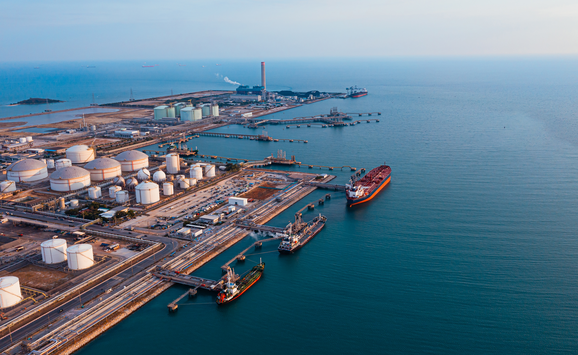After six years of discussion and preparatory meetings, the Third United Nations Conference on the Law of the Sea opened in New York in December. The curtain was rung up on the prologue to these proceedings in December 1967, when Ambassador Arvid Pardo, then Permanent Representative of Malta to the United Nations, introduced a "note verbale" into the General Assembly. This note, calling for a "Study of the Peaceful Uses of the Sea-Bed and the Ocean Floor beyond the Limits of National Jurisdiction," led to the creation of an "Ad Hoc Committee" of 35 states. The following year, the "Ad Hoc" was removed from the title and the committee was established with forty-two members.
By 1970, it was decided that there should be a Third UN Conference on the Law of the Sea (the first two having been held in 1958 and 1960). At this time, also, the committee was enlarged to eighty-five members, because the subject was attracting increasing attention from the developing countries. China and four other states joined in 1972. Throughout this period the discussions increased in intensity until, by 1973, the delegates were spending five weeks in the spring and eight weeks in the summer on discussions, as well as days and weeks at various and sundry group meetings, not to mention numerous within-country preparatory meetings and discussions.
In December 1973, the committee was abolished and replaced by the UN Conference, with a membership of more than 145 countries. The first act of this conference was a two-week organizing session, in New York, on membership, committee seats, and voting procedures.
As this is the first official international conference to involve such a large number of states, it faces more sharply and intensely than ever before the problems of majority rule and minority rights. Since the minority in this case consists of the major maritime powers, whose disagreement could wreck the conference, and since these powers do not share identical positions, the negotiations and trade-offs will be extremely complicated.
In addition, among many other subjects, the conference is dealing with the disposition of the world's only tangible item of mineral wealth that is well beyond the borders of any country and thus nonnational in character—the deep-sea "manganese" nodules. This gives a distinct ideological cast to the proceedings, centering around the management and distribution of this "common heritage of mankind" and providing a unique focus for the struggle between the developed and the developing world. Failure of the conference to agree on a harmonious sharing of the fruits of exploitation of the manganese nodules could portend an inability of countries to resolve wider conflicts over the environment and other elements of the "common heritage of mankind."
With such pressures at work, the Third Conference was little more than a week old before the first test of strength emerged. The United States faced opposition to its request for a seat on both the general and the drafting committees, traditionally granted to the permanent members of the Security Council. There were rumors that the United States would walk out of the conference unless these two seats were obtained. The Soviets had earlier been assured of seats on both of the important committees, since candidacy was determined by regional groups, and the USSR had the unquestioned backing of its Eastern European neighbors. But the United States had been thrown in with "WEO" (Western Europeans and Others) and, while it was assured of a seat on one of the committees, it had to fight for the other. Seven candidates emerged for the five WEO seats on the general committee, and the voting went into a secret ballot by all members present. The United States won, aided by the potential threat of its withdrawing from the conference.
Most of the two weeks having been spent in tugging and hauling and the testing of waters, only two days remained for the really difficult problem of reaching agreement on the procedures for voting. Agreement could not possibly be reached in this time, and so the task has been left for the opening week of the major, ten-week session that begins in Caracas on June 20, 1974. Unless informal meetings between now and then can produce a solution readily acceptable to the Caracas delegates, the voting wrangle may chew up more conference time. Since additional time will have to be spent in bringing fifty or so newcomer states into position to understand the various problems, opportunities, and options, the chances of reaching agreement by the end of the ten weeks are negligible.
It is thus now widely accepted that the conference will have to be extended into 1975, and that the 1975 sessions will be held in Vienna. But even if agreement should be reached at that time, long further delay in implementation is inevitable because of the time required for ratification. This delay does not sit well with many U.S. legislators, whose constituents want compatible solutions now rather than possibly unacceptable solutions several years hence. The several companies which have gone about as far as they can in testing their technologies for deep-sea dredging of manganese nodules are anxious to put their research to work. But all except Howard Hughes seem to find it difficult to raise or expend the necessary capital while the nature and authority of the prospective regime for the seabed remains so uncertain.
Hughes, who does not need to report to stockholders or seek financing from banks, sent his Glamor Explorer from Philadelphia last August to some unrevealed spot in the Pacific, where the nodules are expected to be high in content of nickel, copper, cobalt, and manganese. This "go-it-alone" approach has understandably disturbed other U.S. mining companies that do not enjoy such freedom. Thus, seeking some guarantee that would satisfy banks, their stockholders and the banks, they have supported S. 1134, a bill introduced by Senator Metcalf and others, designed to provide authority for deep-sea mining "pending adoption of an international regime."
This bill attempts to assure U.S. companies that they will have some security of tenure against the trespass of fellow nationals. It would also underwrite losses that U.S. companies might incur if an eventual international regime should expropriate or otherwise impair the value of their investments without corresponding compensation.
The developing countries are understandably disturbed about this threat of a U.S. go-it-alone approach. The State Department is trying to maintain diplomatic tranquility while waiting for an orderly international solution to the problem. It is supported by the Defense Department, because of fears that developing states may retaliate by refusing free transit of naval craft through enlarged territorial seas. It remains to be seen whether Congress will in the end bow to this view of U.S. interests or to that which insists on the need to accelerate exploitation of the deep-sea mineral resources.
Many U.S. fishermen are also impatient with the lack of progress in law-of-the-sea deliberations, and they too have submitted a bill labeled as an interim measure and proposing unilateral action. But theirs is a different problem, and their proposed legislation is more congenial to the interests of most developing states, while less attractive to our fellow maritime powers. Their bill, S. 1988, introduced by Senator Magnuson and others, calls for an extension of U.S. fisheries jurisdiction from the present 12 miles to a distance of 200 miles from our shores. This attitude is a response to the growing depletion of nearby stocks by the vessels of far distant states, to a rapidly increasing amount of foreign fishing effort, and to the inability of traditional approaches to resolve the problems of fisheries management.
While the Magnuson bill is only one of many of its sort that have been introduced with increasing frequency over the past few years, it is the first one with powerful Congressional backing and the first one on which extended public hearings are planned. The first of these, held near the close of the year, heard spokesmen from the fishing industries of New England and the North-west, the regions most significantly affected by the growing presence of foreign fleets. Although these fishermen anticipate that the eventual U.S. position ( and UN agreements) will be in accord with their demands for extended limits of coastal-nation authority, they do not feel that they can wait for this outcome. Like the Icelanders, who extended their limits to fifty miles and who, after a year of confrontation, finally obtained the reluctant acquiescence of the British late in 1973, they feel that any delay in the acquisition and exercise of authority could lead to further decimation of valuable fish stocks.
This position, however, is not shared by our tuna, spiny lobster, and shrimp fishermen, who take their catches off the shores of Latin American countries: clearly any unilateral outward move by the United States would make it impossible for them to protest the 200-mile claims of others. The State and Defense Departments also do not take a kindly view of the Magnuson bill, because such unilateral action would throw away a bargaining chip in the game with the developing states and would antagonize our sometime allies among the maritime powers, including the Soviets.
Both the Magnuson and the Metcalf bills provide threats to the success of negotiations at the UN Conference. More important, they imply warnings about the likely difficulties of getting Congressional approval for the ratification of the conference conventions. The compromises necessary to produce conventions may be very painful to particular U.S. interests. Thus, the task of our negotiators—at Caracas and Vienna—is not an enviable one. They are at the forefront of a new era of international treaty-making and must acquire an extremely delicate touch to maintain the necessary balance among conflicting elements, both at home and abroad, in an arena where the smallest of nation-states has a voice as strong as the most powerful, and at a time when international cooperation is being weakened by demands for self-sufficiency in natural resources.





